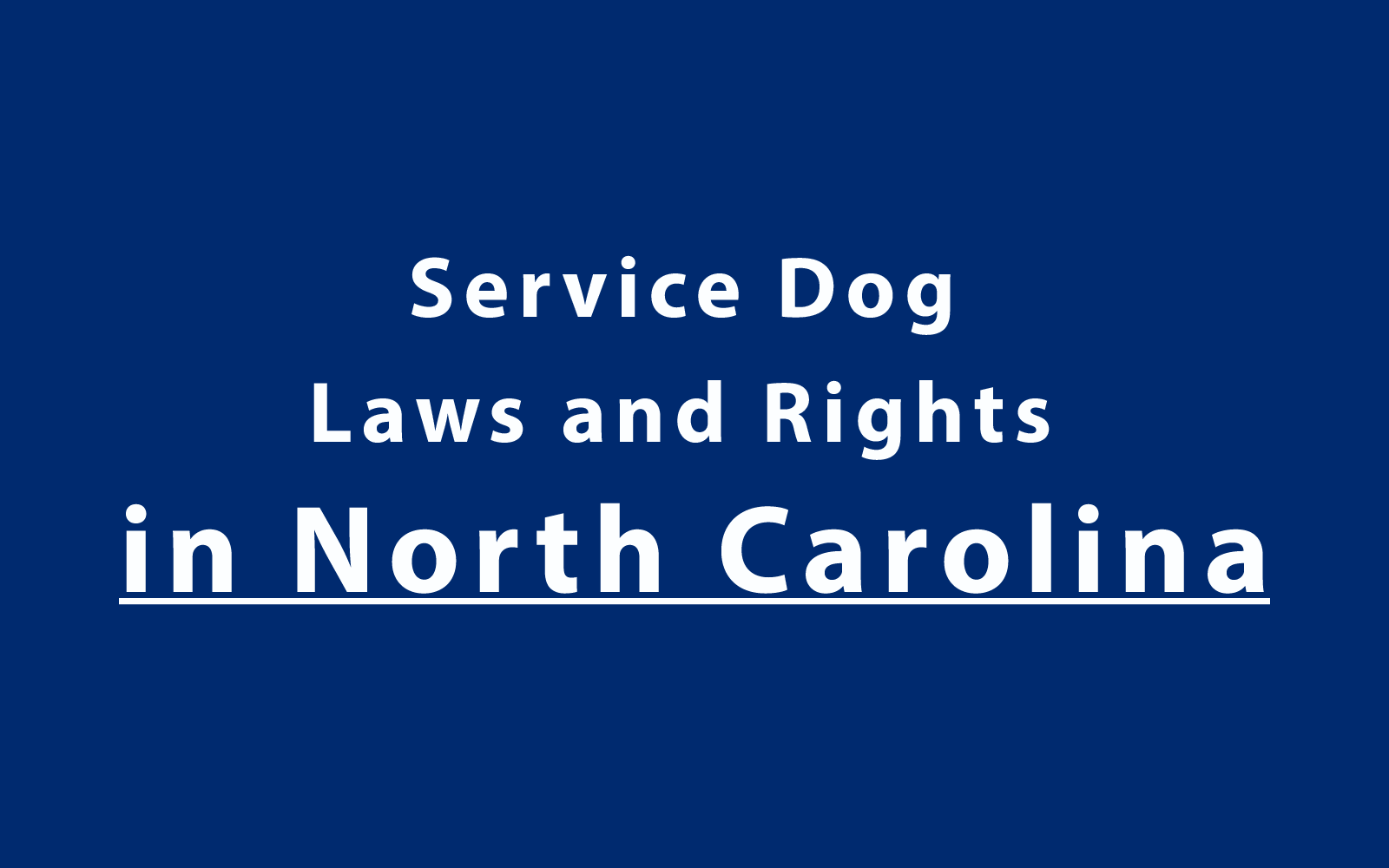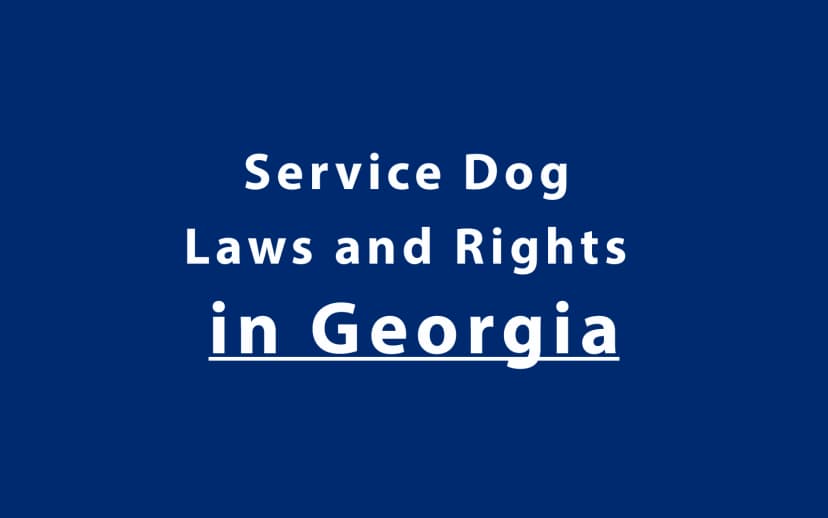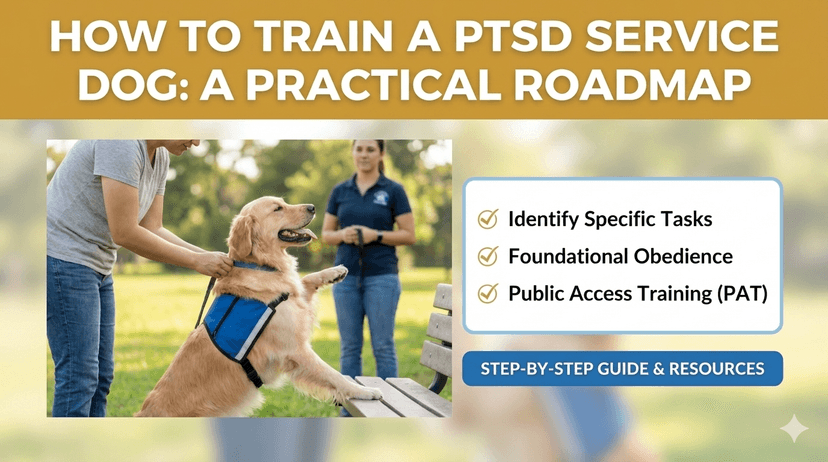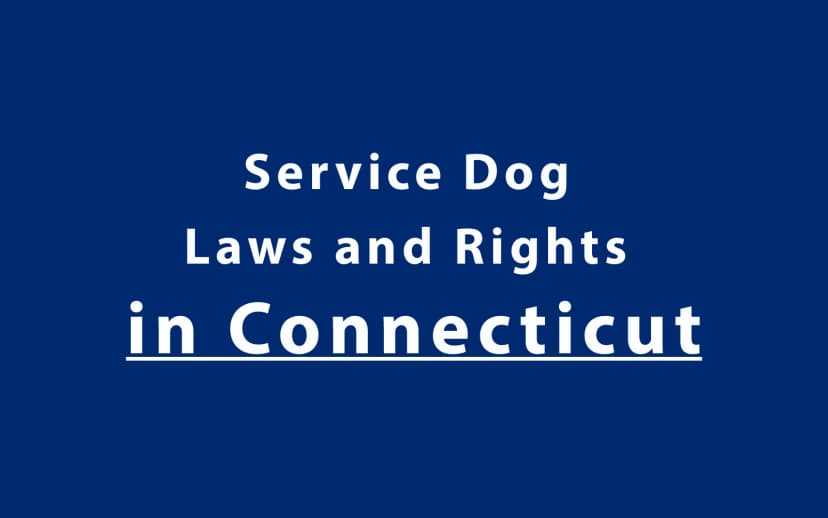Service Dog Laws and Rights in North Carolina

Living with a disability presents many daily challenges—but for thousands of North Carolinians, a trained service dog provides vital assistance that enables greater independence, mobility, and peace of mind. These dogs are more than pets; they are essential working partners that perform specific tasks to support individuals with physical, psychiatric, or sensory disabilities.
Whether you’re already partnered with a service dog, training one, or navigating public life with your canine assistant, understanding your legal rights in North Carolina is essential. This comprehensive 2025 guide covers everything you need to know—from public access to housing protections, workplace accommodations, and more.
1. What Legally Counts as a Service Dog in North Carolina
Under the Americans with Disabilities Act (ADA), a service dog is defined as a dog that is individually trained to perform tasks directly related to a person’s disability. These tasks vary depending on the nature of the disability but may include:
- Guiding individuals who are blind or have low vision
- Alerting someone with hearing loss to sounds
- Assisting with mobility or balance
- Alerting to oncoming medical episodes (e.g., seizures or low blood sugar)
- Interrupting dissociative or self-harming behaviors
- Performing deep pressure therapy for individuals with PTSD or anxiety
North Carolina’s own laws, particularly General Statutes Chapter 168, recognize and reinforce the ADA’s service dog definition.
❗ Important Note: Emotional Support Animals (ESAs), therapy dogs, and comfort animals—while incredibly beneficial—do not qualify as service dogs under ADA or North Carolina law. These animals are not trained to perform specific tasks and therefore do not have the same legal rights.
2. Public Access Rights in North Carolina
Service dogs are legally permitted to accompany their handlers in virtually all public spaces in North Carolina, including:
- Restaurants and cafés
- Retail stores and malls
- Hospitals, clinics, and medical offices
- Parks and recreational areas
- Hotels and motels
- Public transit systems
- Museums, libraries, and entertainment venues
- Government buildings
These rights are guaranteed under both federal ADA law and North Carolina’s Persons with Disabilities Protection Act.
Handler Responsibilities Include:
- Keeping the dog under control at all times (leash, harness, or voice control).
- Ensuring the dog is well-behaved, housebroken, and non-disruptive.
- Accepting liability for the dog’s behavior and public conduct.
When Can Access Be Denied?
A business or public entity may ask a handler to remove a service dog if:
- The dog is out of control and the handler doesn’t take action.
- The dog is not housebroken.
- The dog poses a direct threat to health or safety.
What Questions Can Be Asked?
If your disability is not visible, staff may only ask:
- Is this a service animal required because of a disability?
- What work or task has the animal been trained to perform?
They cannot ask for documentation, demand a demonstration, or inquire about your medical condition.
3. Service Dogs and Housing Laws
Under the Fair Housing Act (FHA), individuals with disabilities have the right to live with their service dog in nearly all types of housing—even if the property has a “no pets” policy.
North Carolina landlords must:
- Permit service dogs without charging pet deposits or monthly pet fees.
- Avoid imposing breed, size, or weight restrictions on service dogs.
- Provide reasonable accommodations for tenants with service animals.
Documentation Guidelines:
- If your disability or the dog’s function is not obvious, landlords may request reliable documentation (e.g., a letter from a healthcare provider).
- They cannot require service dog certification, registration, or training documents.
- All information must be kept confidential under housing privacy rules.
Landlords who violate the FHA can face penalties through HUD investigations or state housing authorities.
4. Employment Rights in North Carolina
Under Title I of the ADA, service dog users are protected from discrimination in employment. This includes the right to request that your service dog accompany you at work.
Employers in North Carolina are required to:
- Consider service dogs as a reasonable accommodation.
- Engage in an interactive process to determine whether the request can be granted.
- Only deny accommodations if they cause undue hardship (e.g., significant expense or workplace disruption).
Steps to Request an Accommodation:
- Notify your employer or HR in writing of your disability and request.
- Provide documentation from a healthcare provider outlining how the dog helps.
- Be open to reasonable adjustments (e.g., limiting access to certain areas).
If your request is denied or you experience discrimination, you can file a complaint with:
- The Equal Employment Opportunity Commission (EEOC)
- The North Carolina Department of Labor – Employment Discrimination Bureau
5. Travel and Transportation Access
Air Travel:
Under the Air Carrier Access Act (ACAA), individuals may fly with their trained service dogs in the aircraft cabin. Psychiatric service dogs (PSDs) are also included under this law.
What airlines may require:
- Completion of the DOT Service Animal Air Transportation Form, affirming that your dog is trained and well-behaved.
- Notice 48 hours in advance of your travel.
- Proof of vaccination or health certification, if applicable.
Ground Transportation in North Carolina:
- Public Transit (e.g., GoRaleigh, GoDurham, Charlotte Area Transit System): Service dogs are welcome onboard at no extra cost.
- Amtrak: Permits service dogs under ADA guidelines.
- Taxis and rideshare services (Uber, Lyft): Drivers must accommodate service dogs. Refusal may result in deactivation from the platform.
6. Service Dogs in Schools and Universities
K–12 Schools:
Under IDEA and Section 504 of the Rehabilitation Act, public schools in North Carolina must allow students with disabilities to bring trained service dogs to school.
- The dog must be under control and well-behaved at all times.
- Schools cannot require certification but may request information about the dog’s task and health/vaccination status.
Colleges and Universities:
Post-secondary institutions must follow the ADA, and cannot deny access to students who use service dogs.
- Students are encouraged to contact Disability Services to coordinate housing and classroom access.
- Staff cannot ask for training credentials but may seek clarification on the dog’s role.
7. Registration and Training of Service Dogs in North Carolina
There is no legal requirement for service dog registration, ID, or vesting in North Carolina or under federal law. However, voluntary registration can help prevent conflicts or misunderstandings in public.
Training Standards:
- Handlers may self-train their service dog.
- Alternatively, dogs may be trained by a professional trainer or organization.
- All service dogs must be individually trained to perform at least one task related to the handler’s disability and exhibit excellent public behavior.
At AssistanceDogPartners.org, we offer:
- Voluntary service dog registration with ID cards and documentation.
- Online task training courses for psychiatric, mobility, and medical alert service dogs.
- Tools to help your dog pass a virtual Public Access Test (PAT) for additional credibility.
8. Penalties for Service Dog Fraud in North Carolina
Under North Carolina General Statute § 168-4.5, it is a Class 3 misdemeanor to falsely present a pet as a service animal.
Fraud includes:
- Using vests or ID tags to misrepresent untrained pets.
- Entering public spaces with a pet while claiming it’s a service dog.
- Knowingly providing false information to landlords or employers.
Penalties may include:
- Fines
- Community service
- Court-mandated education on disability law
Fraud not only undermines public trust but also damages the credibility and safety of people who genuinely rely on service dogs.
9. State and Local Resources for Handlers
If you need help understanding your rights or accessing resources, the following North Carolina services can help:
North Carolina Department of Health and Human Services – Disability Services
Disability Rights North Carolina (DRNC)
Legal advocacy for individuals with disabilities
https://disabilityrightsnc.org
North Carolina Vocational Rehabilitation Services
Offers employment and accessibility support
https://www.ncdhhs.gov/divisions/dvrs
Local service dog trainers and organizations in Charlotte, Raleigh, Durham, and Asheville
11. Frequently Asked Questions
Q: Do I need to register my service dog in North Carolina?
A: No. Registration is not legally required but may help prevent public misunderstandings.
Q: Can my landlord charge me a pet deposit for my service dog?
A: No. Service dogs are not considered pets, and you cannot be charged pet-related fees.
Q: Are psychiatric service dogs covered under the law?
A: Yes. As long as they are trained to perform tasks related to a mental disability, PSDs have full legal protection.
Q: What should I do if a business denies me entry with my service dog?
A: Ask to speak to a manager and explain your rights. If you are still denied, file a complaint with the NC Human Rights Commission or ADA.gov.
Conclusion
North Carolina provides comprehensive protections for people with disabilities who rely on service dogs. Whether you need help with public access, housing, employment, or education, the law is on your side.
As a handler, it’s your responsibility to ensure your service dog is well-trained and under control—but it’s also your right to live and move freely with your dog by your side.
At AssistanceDogPartners.org, we’re proud to support you with trusted training, optional registration, and advocacy tools to help you thrive.



